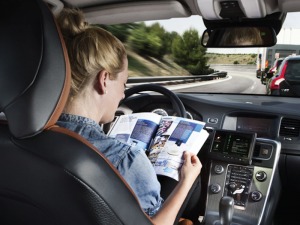Drivers must not be responsible for fully automated accidents, says insurance industry
Drivers of fully automated vehicles must not be held liable for accidents involving their cars while the technology is in charge.

The insurance industry says drivers of fully automated vehicles should not be held liable for accidents involving their cars while the technology is in charge
That’s the message from the insurance industry, which says it would be unfair to expect drivers to intervene if onboard systems got something wrong or were unable to prevent an accident.
The call comes from the Association of British Insurers (ABI), which has submitted its views to the Law Commission which is helping work out how the UK will incorporate the rules currently being decided internationally on standards for autonomous vehicles.
The over-riding message is that carmakers must not be allowed to have their vehicles recognised as autonomous when a driver might still be expected to act in an emergency.
Instead, the industry says that until a vehicle can handle emergency scenarios without driver intervention they can only be considered to offer advanced driver assistance. In these vehicles, drivers do remain fully responsible for the car and must be ready to take back control at any moment.
The message builds on ongoing calls from the industry, including Thatcham Research, for carmakers to stop misleading drivers by using ‘autonomous’ terms for technology that still requires driver involvement. It’s previously set out 10 criteria that all cars must have before they can be called ‘automated’.
Matthew Avery, director of research at Thatcham Research, said: “The life-saving potential of fully automated vehicles is clear, but it is important their introduction onto the UK’s roads is handled carefully to guard against serious accidents which could potentially undermine public trust in this new technology. This also means reassuring the public that when the time comes, they will not find themselves being held liable for the actions of a truly autonomous vehicle.
“Until this time, there will be a mix of vehicles on our roads with different capabilities: some being driven manually, others automatically. So it is vital that we make sure they can share the same road space, and remain safe. Organisations such as ours will have an important role to play in helping ensure they do, whilst also helping consumers understand what is expected of them when they are behind the wheel.”
A working party on automated, autonomous and connected cars, part of the UNECE (United Nations Economic Commission for Europe), is in the process of setting out detailed criteria vehicles will have to meet to be considered autonomous. The UK government’s ambition is to have the necessary legislation in place to allow fully automated vehicles on British roads from 2021, but insurers want to make sure the transition is handled as safely as possible.
Laurenz Gerger, policy adviser for motor insurance at the ABI, said: “There will come a point when the drivers of today are effectively just passengers of a vehicle driving itself, and at that stage we want motorists to be reassured they can’t be held liable for an error made by a vehicle or a piece of on-board technology. Standards being set internationally, and the way they are adopted in the UK, need to enforce strict requirements to ensure vehicles aren’t rushed onto the roads under the badge of autonomous when in fact they may still need human intervention at short notice.
“Fully autonomous vehicles have the potential to radically improve road safety and insurers are heavily involved in the trials taking place around the country. A safe transition to automated driving requires clear definitions to help consumers understand their own and their vehicles’ responsibilities, and data must be available in the event of an accident to help insurers and the authorities understand what went wrong.”












